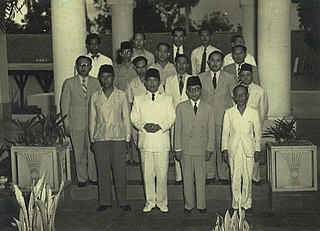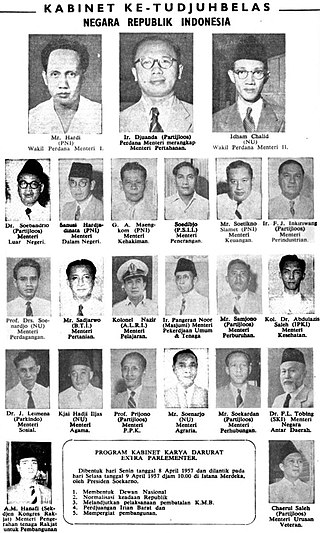
Wilopo was an Indonesian politician and lawyer. A capable administrator, he served as prime minister of Indonesia from 1952 to 1953. He also held various other positions during his career, including as Minister of Labor, Minister of Economic Affairs, speaker of the Constitutional Assembly, and chairman of the Supreme Advisory Council.

The Council of Indonesian Muslim Associations Party, better known as the Masyumi Party, was a major Islamic political party in Indonesia during the Liberal Democracy Era in Indonesia. It was banned in 1960 by President Sukarno for supporting the PRRI rebellion.

The Liberal Democracy period in Indonesia, also known as the Era of Parliamentary Democracy, was a period in Indonesian political history, when the country was under a liberal democratic system. During this period, Indonesia held its first and only free and fair legislative election until 1999, but also saw continual political instability. The period began on 17 August 1950 following the dissolution of the federal United States of Indonesia, less than a year after its formation, and ended with the imposition of martial law and President Sukarno's decree, which resulted in the introduction of the Guided Democracy period on 5 July 1959.

Burhanuddin Harahap was an Indonesian politician and lawyer who served as prime minister of Indonesia from August 1955 until March 1956. He was a member of the Masyumi Party and served as Minister of Defense concurrently with his tenure as prime minister. Afterward, he took part in the unsuccessful Revolutionary Government of the Republic of Indonesia (PRRI) rebellion in West Sumatra.

The Third Sjahrir Cabinet was the fourth Indonesian cabinet. It served from October 1946 to July 1947, when it fell due to disagreements related to the implementation of the Linggadjati Agreement and subsequent negotiations with the Dutch.

The First Amir Sjarifuddin Cabinet was the fifth Indonesian cabinet and was in office from 3 July to 11 November 1947.

The Second Amir Sjarifuddin Cabinet was Indonesia's sixth cabinet and was the result of a reshuffle to allow for the entry of the Masyumi Party, which gained five posts. The cabinet lasted only two months and eleven days, from 11 November 1947 to 29 January 1948, after Masyumi withdrew its ministers in protest at the Renville Agreement the government signed with the Dutch.

The First Hatta Cabinet was Indonesia's seventh cabinet. It was formed by Vice President Mohammad Hatta, who was instructed to do so by President Sukarno on 23 January 1948, the same day the previous cabinet was declared dissolved. Following the second Dutch military aggression, when the republican capital of Yogyakarta was seized and most of the cabinet arrested, much of the cabinet was captured and sent into exile, although it was not formally disbanded. After the political leadership returned effective 13 July 1949 the cabinet continued its mandate until it was reshuffled on 4 August.

The Second Hatta Cabinet was Indonesia's ninth cabinet. It was formed after the Indonesian leadership, which had been imprisoned by Dutch forces, returned to the capital, Yogyakarta. It served from 4 August to 20 December 1949.

Soekiman Wirjosandjojo was an Indonesian politician and physician who served as prime minister of Indonesia from 1951 until 1952. Additionally, Soekiman served as the first president of the Masyumi Party from 1945 to 1951.

The Halim Cabinet was the second and final cabinet of the Republic of Indonesia while it was one of 16 states in the United States of Indonesia. It served from 21 January until 15 August 1950, when the United States of Indonesia was dissolved and Indonesia once again became a unitary state.

The Natsir Cabinet was the first cabinet formed after the dissolution of the United Republic of Indonesia and returned to the Unitary State of the Republic of Indonesia. This cabinet was in charge from 6 September 1950 until 20 March 1951.

Indonesian Islamic Union Party was an Islamic political party in Indonesia before and after independence. In 1973 it was merged into the United Development Party.

The Soekiman Cabinet, also known as the Sukiman-Suwirjo Cabinet, was an Indonesian cabinet that served from 27 April 1951 until it fell on 23 February 1952 following revelations that it had signed a mutual security agreement with the United States, and was dissolved on 3 April 1952.

The Burhanuddin Harahap Cabinet was an Indonesian cabinet, named after the prime minister, that served from 12 August 1955 until 24 March 1956.

The Second Ali Sastroamidjojo Cabinet, also known as the Ali-Roem-Idham Cabinet was an Indonesian cabinet that served from 24 March 1956 until 9 April 1957.

The Djuanda Cabinet, also known as the Working Cabinet, was an Indonesian cabinet that served from 9 April 1957 until 10 July 1959, when it was dissolved by a decree from President Sukarno.

Oetarjo Anwar Tjokroaminoto was an Indonesian politician and journalist. He served as Minister of Social Affairs for a year in the Wilopo Cabinet and was the Prime Minister of Pasundan for less than a month during January 1950.

Prawoto Mangkusasmito was an Indonesian politician who served as the final chairman of the Masyumi political party before its dissolution in 1960. He also served as the Deputy Prime Minister of Indonesia during the Wilopo Cabinet between 1952 and 1953.

The Tanjung Morawa affair was a clash between peasant squatters and the police which occurred on 16 March 1953 in Tanjung Morawa, North Sumatra. The incident, which stemmed from a land dispute between the squatters and foreign plantation owners, resulted in the deaths of five peasants and the downfall of Prime Minister Wilopo and his cabinet.





















